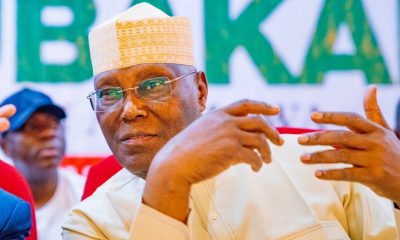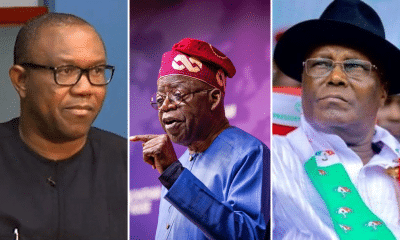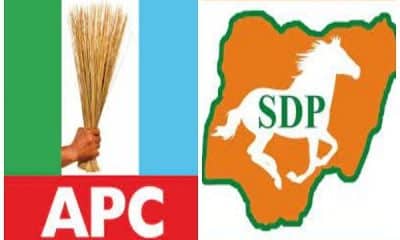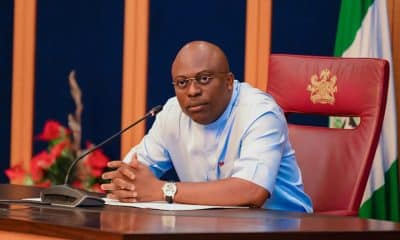Business
Stock Market: Political Activities, Onnoghen’s Case, Cause Investors To Lose Over N3.43 Trillion
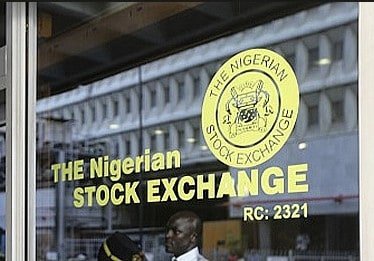
Stock Brokers Advise Politicians To Moderate Activities
Political activities ahead of the 2019 elections have been said to be adversely affecting the nation’s stock market, as investors have lost over N3.43 trillion in nine months of persistent decline.
Many blue-chip companies quoted on the Nigerian Stock Exchange (NSE) have also experienced unprecedented losses, contrary to the general expectations of positive earnings in 2018.
The losses were calculated as at close of trading on May 10, 2018, when the announcement of the ward congresses was made, to the last trading day in January 2019.
Analysts, operators, and investors, at the weekend, blamed the persistent lull on perceived risk associated with the coming 2019 general elections, making mostly foreign investors embark on a massive selloff and consequently exit the market.
According to the stakeholders, since the last eight months when the political activities have been on the upswing, the market has been on the downward trend with an up-and-down fluctuation per week.
According to them, the decline increased after the news about the crisis-ridden ward congresses broke out since May 2018, after a January rise triggered strong anticipations amid improving macro-economic indicators in domestic and global economies.
Naija News reports that the ward congresses of the ruling All Progressives Congress (APC) held across the country during the period were bedevilled by conflict, resulting in cancellation and rescheduling of polls in some states.
The development according to analysts caused indifference and low investor confidence. Consequently, foreign investors that play a dominant role in the market resorted to a massive sell-off of shares.
The capitalization, which stood at N14, 820 trillion as at Thursday, May 10, 2018, later stood at N11, 394 trillion as at Thursday, January 31, 2019, representing N3.43 trillion or 30.1 per cent loss.
Also, the All-Share Index declined by 10,357.74 points or 33.9 per cent to 30,557.20 from 40,914.94, achieved as at May 10, 2018.
The analysts also blamed the flattish look of the market on the heightening tension in the political environment in recent times, the latest being the alleged illegal suspension of the Chief Justice of Nigeria (CJN), Walter Onnoghen.
Naija News reports that the President Muhammadu Buhari-led government suspended Onnoghen after charging him with false declaration of assets, a move which some Nigerians and other stakeholders have condemned.
The analysts noted that, is in spite of warning by some capital market players that politicians should refrain from activities and utterances capable of heating up the polity and causing dire consequences for the capital market.
The Association of Stockbroking Houses of Nigeria (ASHON) had in May 2018 warned that political uncertainties and all sorts of insecurity that pervaded the country were affecting investors’ sentiments, asset valuations, market, and country risk profile as well as portfolio allocation decisions.
The group appealed to the political class to moderate their activities and utterances by acting in such a manner that will engender investors’ confidence in the economy and by extension the capital market.
“Our market is bleeding. Foreign portfolio investors and their indigenous counterparts have embarked on massive sell-down of shares on the Nigerian Stock Exchange with the attendant effect of a gross diminution of share prices despite stellar performances of many listed companies.
“Theories of investors’ behavior have revealed that bad news triggers market panic and investors over-react to such news. As the country’s economic barometers, the exchanges in Nigeria have continued to reflect investors’ apprehensions of instability in the political and economic landscape through all their indices. There is a clear and present danger if the trend continues.
“The Nigerian Stock Exchange’s all share index has been sliding since the beginning of the year. Innocent shareholders watch helplessly as the bear market plunders their investment. Studies have shown that there is a correlation between the development of the capital market and economic growth and development of any country.
“As stockbrokers trained to create wealth and manage investments, we hasten to say that projections cannot be made under this atmosphere of systematic risk. Consequently, the country’s risk profile is building up and investment decision is obviously threatened. This explains why investors are panicky,” the association explained.
In his reaction, an independent investor, Amaechi Egbo, expressed regret that the politicians have failed to heed the warning not to heat up the polity.
“The discordant tunes over the removal of the CJN have triggered a pullback in the equity market to halt the bullish run witnessed in the past few days. The announcement has continued to spur massive selloff with tremendous slow down in position taking in blue-chip stocks presently,” he said.



